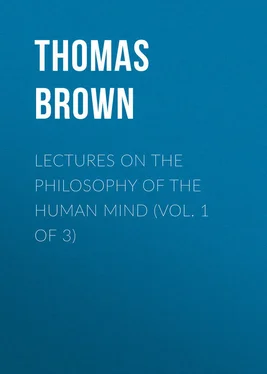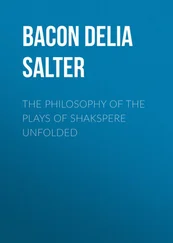Thomas Brown - Lectures on the Philosophy of the Human Mind (Vol. 1 of 3)
Здесь есть возможность читать онлайн «Thomas Brown - Lectures on the Philosophy of the Human Mind (Vol. 1 of 3)» — ознакомительный отрывок электронной книги совершенно бесплатно, а после прочтения отрывка купить полную версию. В некоторых случаях можно слушать аудио, скачать через торрент в формате fb2 и присутствует краткое содержание. Жанр: foreign_antique, foreign_prose, на английском языке. Описание произведения, (предисловие) а так же отзывы посетителей доступны на портале библиотеки ЛибКат.
- Название:Lectures on the Philosophy of the Human Mind (Vol. 1 of 3)
- Автор:
- Жанр:
- Год:неизвестен
- ISBN:нет данных
- Рейтинг книги:5 / 5. Голосов: 1
-
Избранное:Добавить в избранное
- Отзывы:
-
Ваша оценка:
- 100
- 1
- 2
- 3
- 4
- 5
Lectures on the Philosophy of the Human Mind (Vol. 1 of 3): краткое содержание, описание и аннотация
Предлагаем к чтению аннотацию, описание, краткое содержание или предисловие (зависит от того, что написал сам автор книги «Lectures on the Philosophy of the Human Mind (Vol. 1 of 3)»). Если вы не нашли необходимую информацию о книге — напишите в комментариях, мы постараемся отыскать её.
Lectures on the Philosophy of the Human Mind (Vol. 1 of 3) — читать онлайн ознакомительный отрывок
Ниже представлен текст книги, разбитый по страницам. Система сохранения места последней прочитанной страницы, позволяет с удобством читать онлайн бесплатно книгу «Lectures on the Philosophy of the Human Mind (Vol. 1 of 3)», без необходимости каждый раз заново искать на чём Вы остановились. Поставьте закладку, и сможете в любой момент перейти на страницу, на которой закончили чтение.
Интервал:
Закладка:
Nor is it from the danger of scepticism only, that a just view of the principles of his intellectual constitution tends to preserve the philosophic inquirer. It saves him, also, from that presumptuous and haughty dogmatism, which, though free from doubt, is not, therefore, necessarily free from error; and which is, indeed, much more likely to be fixed in error than in truth, where the inquiry, that precedes conviction, has been casual and incomplete. A just view of our nature as intelligent beings, at the same time that it teaches us enough of our strength to allow us to rest with confidence on the great principles, physical, moral, and religious, in which alone it is of importance for us to confide, teaches us also enough of our weakness, to render us indulgent to the weakness of others. We cease to be astonished that multitudes should differ from us; because we know well, that while nature has made a provision for the universal assent of mankind to those fundamental physical truths, which are essential to their very existence, and those fundamental truths of another kind, which are equally essential to their existence as subjects of moral government, she has left them, together with principles of improvement that ensure their intellectual progress, a susceptibility of error, without which there could be no progression; and while we almost trace back the circumstances which have modified our own individual belief, we cannot but be aware, at the same time, how many sources there are of prejudice, and, consequently, of difference of opinion, in the various situations in which the multitudes, that differ from us, have been placed. To feel anger at human error, says an ancient philosopher, is the same thing as if we were to be angry with those who stumble in the dark, – with the deaf for not obeying our command, – with the sick, – with the aged, – with the weary. That very dulness of discernment, which excites at once our wonder and our wrath, is but a part of the general frailty of mortality; and the love of our errors is not less inherent in our constitution than error itself. It is this general constitution which is to be studied by us, that we may know with what mistakes and weaknesses we must have to deal, when we have to deal with our fellow-men; and the true art, therefore, of learning to forgive individuals , is to learn first how much we have to forgive to the whole human race . “Illud potius cogitabis, non esse irascendum erroribus. Quid enim, si quis irascatur in tenebris parum vestigia certa ponentibus? Quid si quis surdis, imperia non exaudientibus? Quid si pueris, quod neglecto dispectu officiorum, ad lusus et ineptos æqualium jocos spectent? Quid si illis irasci velis, qui ægrotant, senescunt, fatigantur? Inter cætera mortalitatis incommoda, et hæc est, caligo mentium: nec tantum necessitas errandi, sed errorum amor. Ne singulis irascaris, universis ignoscendum: generi humano venia tribuenda est.” 9 9 Seneca, de Ira, lib. ii. cap. 9.
How much of the fury of the persecuting spirit of darker ages would have been softened and turned into moderation, by juster views of the nature of man, and of all the circumstances on which belief depends! It appears to us so very easy to believe what we consider as true, – or, rather, it appears to us so impossible to disbelieve it, – that, if we judge from our own momentary feelings only, without any knowledge of the general nature of belief, and of all the principles in our mental constitution by which it is diversified, we very naturally look on the dissent of others as a sort of wilful and obstinate contrariety, and almost as an insulting denial of a right of approbation, which we consider ourselves, in these circumstances, as very justly entitled to claim. The transition from this supposed culpability to the associated ideas of pains and penalties, is a very natural one; and there is, therefore a sufficient fund of persecution in mere ignorance, though the spirit of it were not, as it usually is, aggravated by degrading notions of the divine Being, and false impressions of religious duty. Very different are the sentiments which the science of mind produces and cherishes. It makes us tolerant, not merely by showing the absurdity of endeavouring to overcome, by punishment, a belief which does not depend on suffering; but which may remain, and even gather additional strength, in imprisonment, in exile, under the axe, and at the stake. The absurdity of every attempt of this kind it shews indeed; but it makes us feel, still more intimately, that injustice of it, which is worse than absurdity, – by shewing our common nature, in all the principles of truth and error, with those whom we would oppress; all having faculties that may lead to truth, and tendencies of various kinds which may mislead to error, and the mere accidental and temporary difference of power being, if not the greatest, at least the most obvious circumstance, which, in all ages, has distinguished the persecutor from the persecuted .
Let not this weak, unknowing hand,
Presume thy bolts to throw;
Or deal damnation round the land,
On all I judge thy foe!
If I am right, – thy grace impart,
Still in the right to stay;
If I am wrong, – O, teach my heart,
To find the better way. 10 10 Pope's Universal Prayer, v. 25–32.
Such is the language of devout philosophy. No proud assertion of individual infallibility, – no triumph over the consequences in others, of a fallible nature, which ourselves partake in common, – but the expression of feelings more suited to earthly weakness, – of a modest joy of belief, which is not less delightful for the humility that tempers it; and of a modest sorrow for the seeming errors of others, to which the consciousness of our own nature gives a sympathy of warmer interest. The more important the subject of difference, the greater , not the less , will be the indulgence of him who has learned to trace the sources of human error, – of error, that has its origin not in our weakness and imperfection merely, but often in the most virtuous affections of the heart, – in that respect for age, and admiration of virtue, and gratitude for kindness received, which make the opinions of those whom we love and honour seem to us, in our early years, as little questionable, as the virtues which we love to contemplate, or the very kindness which we feel at every moment beaming on our heart, in the tender protection that surrounds us. That the subjects on which we may differ from others, are important to happiness , of course implies, that it is no slight misfortune to have erred ; and that the mere error, therefore, must be already too great an evil to require any addition from our individual contempt or indignation, far less from the vengeance of public authority, – that may be right, in the opinions which it conceives to be insulted by partial dissent; but which must be wrong, in the means which it takes to avenge them. To be sincerely thankful for truths received, is, by the very nature of the feeling, to be sensible how great a blessing those have lost who are deprived of the same enjoyment; and to look down, then, with insolent disdain, on the unfortunate victim of error, is, indeed to render contemptible, (as far as it is in our feeble power to render it contemptible,) not the error which we despise, but the truth which allows us to despise it.
The remarks which I have as yet made, on the effects of acquaintance with the Philosophy of Mind, relate to its influence on the general spirit of philosophical inquiry; the advantages which must be derived, in every science, from a knowledge of the extent of the power of the intellectual instruments which we use for the discovery of truth; the skill which we thence acquire in distinguishing the questions in which we may justly hope to discover truth, from those questions of idle and endless controversy, the decision of which is altogether beyond the reach of our faculties; and the consequent moderation in the temper, with which we look both to our own possible attainments, and to the errors of others.
Читать дальшеИнтервал:
Закладка:
Похожие книги на «Lectures on the Philosophy of the Human Mind (Vol. 1 of 3)»
Представляем Вашему вниманию похожие книги на «Lectures on the Philosophy of the Human Mind (Vol. 1 of 3)» списком для выбора. Мы отобрали схожую по названию и смыслу литературу в надежде предоставить читателям больше вариантов отыскать новые, интересные, ещё непрочитанные произведения.
Обсуждение, отзывы о книге «Lectures on the Philosophy of the Human Mind (Vol. 1 of 3)» и просто собственные мнения читателей. Оставьте ваши комментарии, напишите, что Вы думаете о произведении, его смысле или главных героях. Укажите что конкретно понравилось, а что нет, и почему Вы так считаете.












![Anne Blunt - A Pilgrimage to Nejd, the Cradle of the Arab Race. Vol. 1 [of 2]](/books/749489/anne-blunt-a-pilgrimage-to-nejd-the-cradle-of-the-thumb.webp)